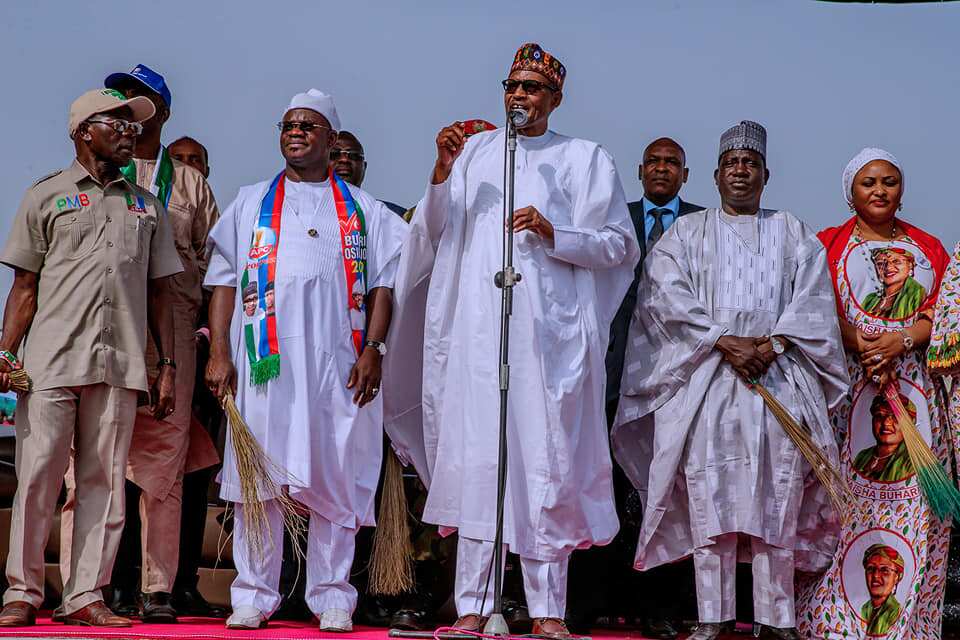President Muhammadu Buhari, during his re-election campaign rally in Kogi state on January 16, took a swipe at the Peoples Democratic Party (PDP), warning Nigerians not to make the “mistake” of voting the main opposition party into power.
The president, according to Daily Trust, said a vote for the PDP would return the country to “the ugly past.”
He said: “I am warning you; don’t make any mistake of choosing any PDP candidate. What they will try to do is to cover the theft they have committed against the nation.”
READ ALSO: Police seal off CJN's office, eject staff

President Buhari addressing the crowd at the Kogi rally. Photo credit: Femi Adesina
Source: Facebook
Criticising the PDP further, President Buhari accused the lead opposition party squandering the nation’s wealth, claiming that Nigeria produced 2.1 million barrels of oil per day at an average price of $100 per barrel under the party’s administration.
He queried: “I have challenged everybody in Nigeria to check in Europe, America and Asia that Nigeria was producing 2.1 million barrels per day at the cost of $100 per barrel. So, Nigeria was earning 2.1 million barrels, times $100, times 16 years. Where was that money?”
Legit.ng reports some of the claims made by the president during the rally in Kogi state as fact-checked by Daily Trust.
Claim 1: Nigeria produced 2.1m barrels of oil during the 16 years of the PDP administration
During the rally, President Buhari claimed that Nigeria produced 2.1m barrels of oil in the last 16 years under the PDP.
The Department of Petroleum Resources (DPR) is Nigeria’s oil industry regulator and publishes annual oil and gas industry report that documents yearly crude oil and condensate production as well as other operations in the industry.
The Nigerian National Petroleum Corporation (NNPC) also publishes an annual statistical bulletin that contains yearly oil and condensate, as well as gas production figures.
A check by Daily Trust, comparing and analysing crude oil and condensate production volumes published by the DPR and NNPC between 1999 and 2015, showed that average crude oil production between 1999 and 2015 was around and sometimes above 2.1 million barrels per day, except in 2002 when output was 1.98m b/d.
Also, the newspaper stated that statistics from the Organisation of Petroleum Exporting Countries (OPEC) analysed within the 16-year period showed that Nigeria’s production was largely within the 2m b/d mark.
Verdict
President Buhari’s claim that Nigeria was producing 2.1 million barrels per day of crude for 16 years is largely true.
Claim 2: Nigeria sells crude oil at the average cost of $100 per barrel
During the rally, President Buhari also reportedly claimed that Nigeria sold crude at the average cost of $100 per barrel during the PDP's 16-year reign.
The claim was reportedly checked against all popular oil pricing benchmarks. The newspaper used two sources to verify President Buhari’s claim.
The first is OPEC (reference) Basket, which is an average of prices of the various petroleum blends that are produced by members, including Nigeria, is one of the most significant benchmarks for crude oil prices worldwide.
OPEC publishes annual reports about the world oil market, which our reporter analysed for the period from 1999 to 2015.
The second is the Brent crude against which Nigeria’s oil is mostly priced. Brent crude price from 1999 up to 2015 was compiled from Statista, one of the world’s leading provider of market and consumer data.
The two major pricing components are reportedly usually applied on crude exports by the NNPC on behalf of the federation.
The newspaper said that the entire data set sampled showed that between 1999 and 2015, oil price only averaged $100 per barrel in 2011, 2012 and 2013. The overall average price of crude reportedly traded below $100 per barrel for most of the 16 years.
Verdict
President Buhari’s claim that oil sold at the average cost of $100 per barrel is incorrect.
PAY ATTENTION: NAIJ.com upgrades to Legit.ng: a letter from our Editor-in-Chief Bayo Olupohunda
Meanwhile, Legit.ng had earlier reported that the Zamfara chapter of the All Progressives Grand Alliance (APGA)had endorsed President Buhari in the February 16 presidential election.
This was disclosed by the governorship candidate of APGA in the state, Alhaji Abdullahi Sani, during the party’s flag-off campaign in Gusau on Saturday, January 26.
Sani said the party was satisfied with President Buhari’s anti-corruption fight, his administration's way of tackling Nigeria's security challenges, job creation and agricultural policy.
NAIJ.com (naija.ng) -> Legit.ng: We have updated to serve you better!
I married four wives, built houses under Buhari's regime - farmer boasts| Legit TV
Source: Legit.ng
from Nigeria News today & Breaking Naija news ▷ Read on Legit.ng 24/7 http://bit.ly/2RSWhbu
via EDUPEDIA24/7
Comments
Post a Comment